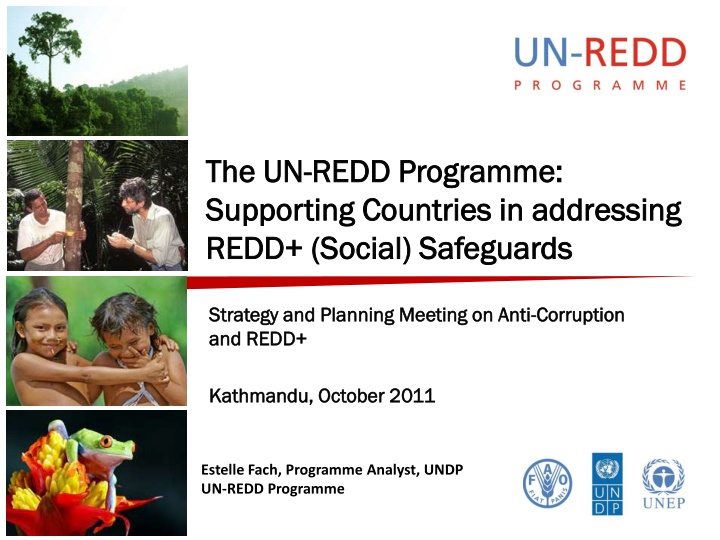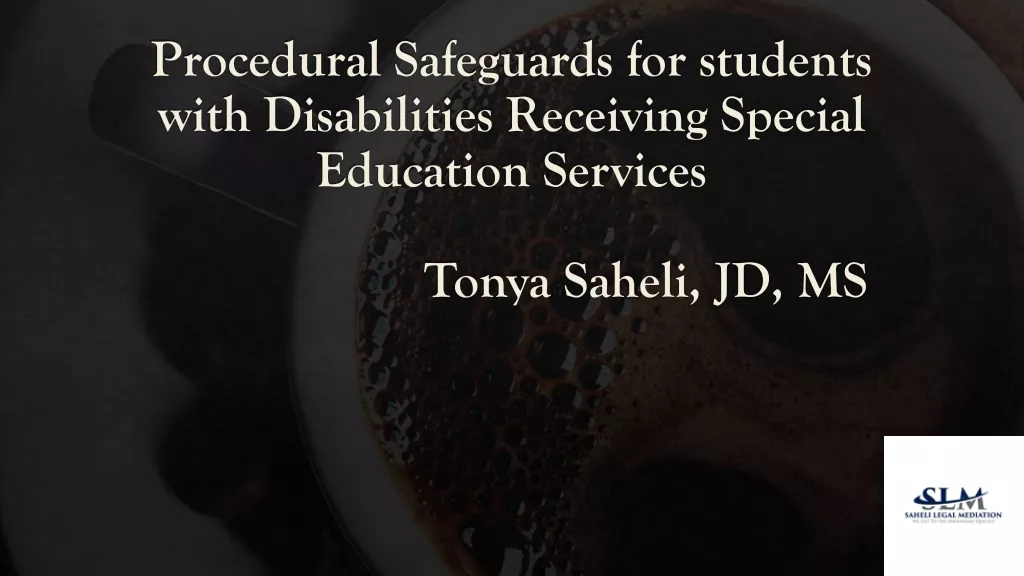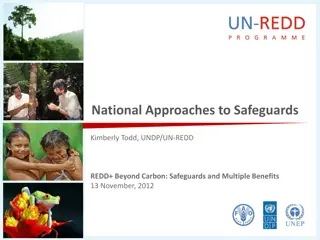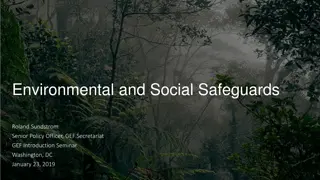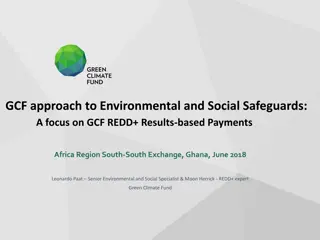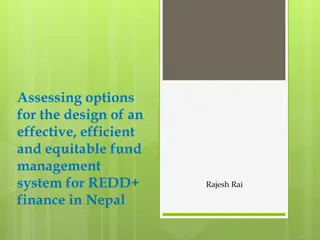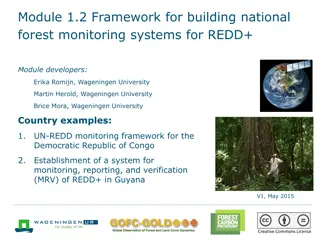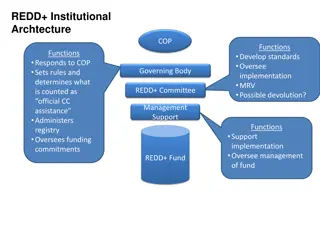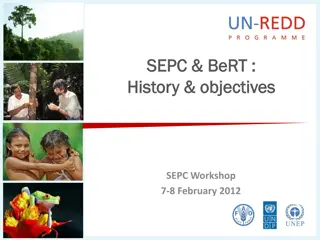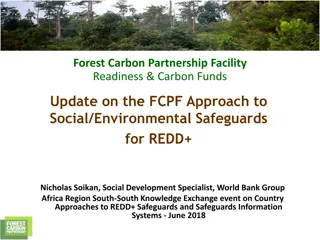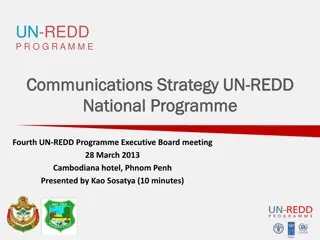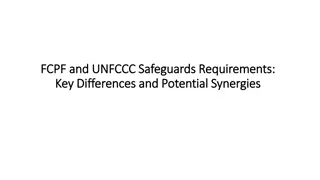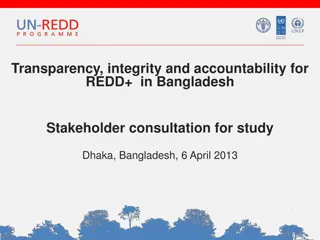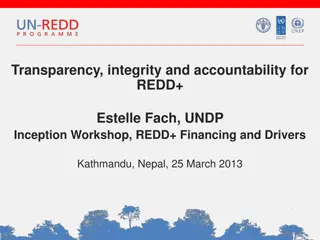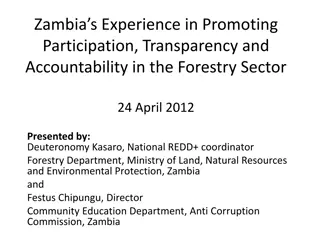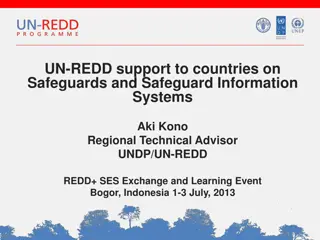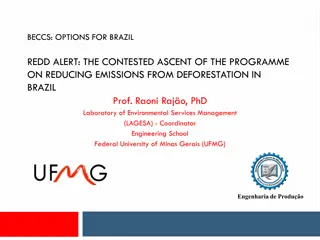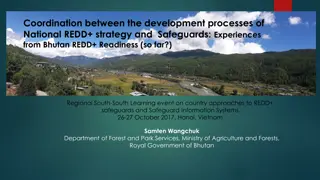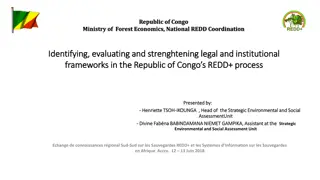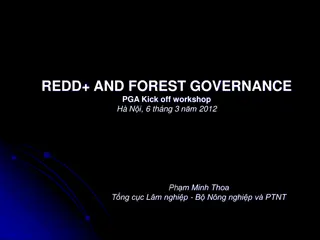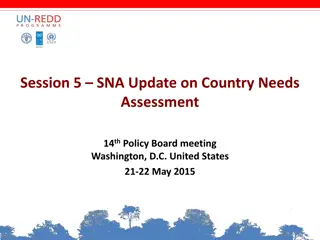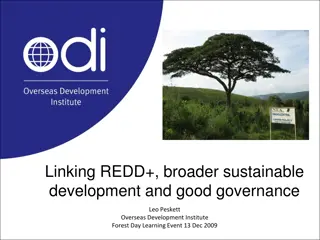UN-REDD Programme and Safeguards: Ensuring Social and Environmental Integrity
The UN-REDD Programme focuses on supporting countries in implementing REDD+ (Reducing Emissions from Deforestation and Forest Degradation) while addressing social safeguards related to indigenous rights, stakeholder engagement, and environmental benefits. It emphasizes the importance of safeguards in national REDD+ systems, providing guidance on managing potential negative impacts and optimizing benefits. The programme also outlines minimum requirements for National Programmes, including government ownership, coherence with national strategies, and operational guidance for engaging indigenous peoples. It emphasizes principles like free, prior, and informed consent, participatory governance assessments, and building information systems for REDD+.
Download Presentation

Please find below an Image/Link to download the presentation.
The content on the website is provided AS IS for your information and personal use only. It may not be sold, licensed, or shared on other websites without obtaining consent from the author.If you encounter any issues during the download, it is possible that the publisher has removed the file from their server.
You are allowed to download the files provided on this website for personal or commercial use, subject to the condition that they are used lawfully. All files are the property of their respective owners.
The content on the website is provided AS IS for your information and personal use only. It may not be sold, licensed, or shared on other websites without obtaining consent from the author.
E N D
Presentation Transcript
The UN The UN- -REDD Programme: REDD Programme: Supporting Countries in addressing Supporting Countries in addressing REDD+ (Social) Safeguards REDD+ (Social) Safeguards Strategy and Planning Meeting on Anti Strategy and Planning Meeting on Anti- -Corruption and REDD+ and REDD+ Corruption Kathmandu, October 2011 Kathmandu, October 2011 Estelle Fach, Programme Analyst, UNDP UN-REDD Programme
UN-REDD Programme and (social) Safeguards Based on : UN Human rights mandate UN-REDD Programme 2011-2015 Strategy Cancun Agreements, Annex I: 2(b) Transparent and effective national forest governance structures (...) 2(c) Respect for the knowledge and rights of indigenous peoples and members of local communities 2(d) The full and effective participation of relevant stakeholders, in particular, indigenous peoples and local communities ( ) 2 (e) Actions are (...) used to (...) enhance other social and environmental benefits (...) UN-REDD Programme: Supports countries in implementing safeguards and providing information on how the safeguards are being addressed Ensures that the UN-REDD Programme activities respect the REDD+ safeguards.
UN-REDD Programme and Safeguards Highlight the importance of safeguards for national REDD+ systems to ensure that potential negative impacts are assessed, identified and managed. Provide guidance as to how the potential multiple benefits of REDD+ can be enhanced and optimized. Reflect the UN-REDD Programme s responsibility to UN conventions, treaties and declarations.
UN-REDD Programme and Safeguards Minimum requirements for National Programmes assessed by external reviewers: Goverment ownership Coherence with national strategies, policies and development planning processes Operational guidance for engagement of Indigenous Peoples and Other Forest Dependent Communities What has been done so far Level of consultation, participation and engagement Programme guidelines for stakeholder engagement in REDD+, jointly with the World Bank FAO & WB s Framework for assessing and monitoring forest governance UN-REDD P R O G R A M M E
UN-REDD Programme and (social) Safeguards Guidelines on Free, Prior and Informed Consent UN-REDD Social and Environmental Principles and Criteria Participatory Governance Assessments (PGA) Support for building information systems for REDD+, including safeguards What s What s under development development under UN-REDD P R O G R A M M E
UN-REDD Social and Environmental Principles and Criteria Objectives, as proposed to the Policy Board (13- 14 October): i) assisting countries in formulating national REDD+ programmes and initiatives for which they seek UN- REDD support; ii) reviewing national programmes prior to submission for a UN-REDD Policy Board decision on funding and iii) assessing national programme delivery
Social and Environmental Principles and Criteria 7 Principles : overarching, fundamental, active statements about the achievement of a desired outcome Under each principle, criteria are the conditions that need to be met by UN-REDD Programme funded activities to contribute to the achievement of the Principle. For each criterion, the Risk Identification and Mitigation Tool - elaborates questions to assist UN-REDD Programme staff, national counterparts and other stakeholders to identify issues to be addressed in order to minimize the risks and enhance the multiple benefits from UN-REDD Programme supported readiness activities - creates concrete linkages between the Principles and Criteria, relevant Multilateral Agreements (including UNCAC), and issue-specific UN-REDD Programme policies and Operational Guidance
Example : Principle, Criteria, Example : Principle, Criteria, Risk identification Risk identification democratic governance democratic governance Principle 1 Apply norms of democratic governance, including those reflected in national commitments and Multilateral Agreements fiduciary and fund management systems Criterion 1 Ensure the integrity and transparency of fiduciary and fund management systems Has the country ratified UNCAC? Has the country been assessed to have a high level of perceived/ experienced corruption? Is corruption known or likely to be common in the country s forestry and other natural resources sectors? Does the national REDD+ strategy make provisions to link REDD+ to the country s anti corruption bodies? Does the national REDD+ strategy identify how REDD+ revenues will be administered in a manner that is transparent and accountable?
Criteria related to Criteria related to corruption/anti corruption/anti- -corruption corruption Principle 1 Apply norms of democratic governance, including those reflected in national commitments and Multilateral Agreements Criterion 1 Ensure the integrity and transparency of fiduciary and fund management systems Criterion 2 Ensure accountability and legitimacy of all bodies representing stakeholders, including through establishing responsive national feedback, complaints and grievance mechanisms, amongst others Criterion 3 Ensure transparency and accessibility of all information related to REDD+, including active dissemination among relevant stakeholders Criterion 4 Ensure the full and effective participation of relevant stakeholders, in particular, indigenous peoples and other forest dependent communities, with special attention to the most vulnerable and marginalized groups Criterion 5 Promote coordination, efficiency and effectiveness, including cooperation across sectors and in the enforcement of laws Criterion 6 Ensure the rule of law and access to justice
Criteria related to Criteria related to corruption/anti corruption/anti- -corruption corruption Principle 2 Respect and protect stakeholder rights, including human rights, statutory and customary rights, and collective rights Criterion 7 Respect and promote the recognition and exercise of equitable land tenure and carbon rights by indigenous peoples and other local communities Criterion 9 Seek free, prior and informed consent of indigenous peoples and other forest dependent communities and respect and uphold the decision taken (whether consent is given or withheld) Principle 3 Promote and enhance forests contribution to sustainable livelihoods Criterion 12 Ensure equitable, non-discriminatory and transparent benefit sharing and distribution among relevant stakeholders with special attention to the most vulnerable and marginalized groups
Next steps On the Principles and Criteria Consultation process October December 2012, at www.un-redd.org Revisions and approval sought by Policy Board in March 2012 On safeguards in general Further work with countries in support for addressing and informing on safeguards Integrating tools and guidelines into a UN-REDD Programme Framework for ensuring social and environmental benefits for REDD+ and addressing its potential risks, to guide the UN-REDD activities.
For more information For more information Visit Visit Email Email un www.un www.un- -redd.org un- -redd@un redd@un- -redd.org redd.org redd.org
